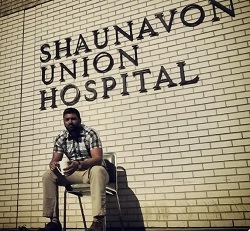
Medicine grad enjoying work in rural Saskatchewan communities
This story is Part 1 of a series with SaskDocs profiling College of Medicine grads working in Saskatchewan.
By Marg SheridanThis story is Part 1 of a monthly series with SaskDocs profiling College of Medicine grads working in Saskatchewan.
Work, for Dr. Paul Dhillon, is going where he’s needed.
And whether that’s his full-time job of working on a week-to-week basis in small single-physician Saskatchewan towns, or his current work at an Ebola treatment centre in Sierra Leone’s picturesque coastal resort town of Tokeh, he can be found working at the vanguard of family medicine.
A Victoria, BC native, Dhillon did his medical school training in Ireland and spent two years following graduation working there before being accepted into the Family Medicine Program in Regina – no small feat for someone considered to be an international medical graduate.
“In Canada there are fewer spots for us, so it’s kind of tough to get back,” Dhillon explained. In fact, in response to a 2006 study, Sandra Banner, executive director and CEO of Canadian Resident Matching Service (CaRMS) told CBCthat in 2011 there was nearly 630 Canadian studying abroad who would be competing for about 400 positions with about 1,800 immigrant medical students who wanted to work in Canada.
Dhillon then found himself in Regina where he completed his residency before accepting a retention bursary from the Saskatchewan Medical Association.
His current contract sees him generally spending a six days a week working in a small towns to provide locum coverage – a task that can take him up to 500km out of town on any given week.
“It’s a great way to see the province,” Dhillon said. “I get to see all sorts of new places and I get to see different practices and medical records – see the things that do and don’t work.”
Of course it doesn’t hurt that, regardless of the retention bursary, Dhillon knew he wanted to work in a rural setting – a choice that would make it easy for him to find employment outside of Saskatchewan, if that’s what he wanted.
“I always knew I wanted to work in a rural area, so I knew I was really comfortable there,” he explained. “But it definitely illustrates to yourself what you do know, what you don’t know, and what you’re comfortable with and not comfortable with.
“And then you get great experience out there when you’re the only physician.”
The support provided for rural doctors by their big-city counterparts is another great part of the job. Regardless of where Dhillon finds himself – no matter how far from Saskatoon or Regina – he’s found that specialists are happy to speak with him when he runs up against something he needs a consultation on.
“I think it’s much lower stress to work in Saskatchewan, and travelling around – there’s so much to see and do. In a year-and-a-half I haven’t seen nearly all the things that I wanted to… other than the mosquitoes I guess,” Dhillon said with a laugh.
Now, however, he’s on a temporary leave to work in Sierra Leone at a Save the Kids UK-run Ebola treatment facility in Tokeh. With a Masters in Disaster Medicine and a Diploma in Tropical Medicine, it was an opportunity that he couldn’t pass-up.
But once his eight weeks in Africa have been completed, and a 21-day isolation period observed, Dhillon will be happy to be back on the road providing front-line care in Saskatchewan’s rural areas.
“The communities are really welcoming and really thankful that you’re there so there’s an incredible amount of job satisfaction.
“I’m always super-happy to go in to work.”
